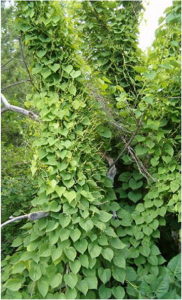Dioscorea is a genus of over 600 species of flowering plants in the familyDioscoreaceae, native throughout the tropical and warm temperate regions of the world. The vast majority of the species are tropical, with only a few species extending into temperate climates.
Contents
Uses
Several species, known as yams, are important agricultural crops in tropical regions, grown for their large tubers. Many of these are toxic when fresh, but can be detoxified and eaten, and are particularly important in parts of Africa, Asia, and Oceania (seeyam article).
One class of toxins found in many species is steroidal saponins, which can be converted through a series of chemical reactions into steroid hormones for use in medicine and as contraceptives.
Benefits
Dioscorea’s traditional use is for easing menstrual cramps. Its antispasmodic property is beneficial for any kind of muscular spasm and colic, such as intestinal and bilious colic, flatulence, ovarian and uterine pain; for poor circulation and neuralgia; for the inflammatory stage of rheumatoid arthritis; and for abdominal and intestinal cramping. Wild Yam can be very beneficial for nervousness, restlessness and other nervous conditions.
As a stimulant for increased bile flow, it can help to relieve hepatic congestion, bilious colic and gallstones.
Also known to have a therapeutic action on overall liver health, it is believed that wild yam root’s ability to lower blood cholesterol levels and lower blood pressure indirectly helps the liver by increasing its efficiency and reducing stress.
Its steroidal saponins are also anti-inflammatory , making it a useful herb when treating rheumatoid arthritis and inflammatory conditions of the bowel. Its diuretic effect, combined with the antispasmodic action, soothes painful conditions of the urinary tract.
Dioscorea contains alkaloids, steroidal saponins, tannins, phytosterols and starch.
Cautions
Chinese yam is safe for most adults, but if you’re taking medication, talk to your doctor about possible side effects.
Though Chinese yam doesn’t contain estrogen, it has properties that can cause it to act like a mild form of estrogen. It can negatively interact with hormone replacement therapy or birth control pills, and pregnant or breast-feeding women should avoid it, as should women with hormone-sensitive disorders, such as:
- endometriosis
- uterine fibrosis
- cancers of the breast, uterus, or ovaries
Allergic reactions are rare, but can include rashes and asthma. Large doses of Chinese yam can cause:
- nausea
- vomiting
- diarrhea
People with a protein S-deficiency should also avoid Chinese yam because its estrogen-like properties may increase the risk of blood clots.
Interactions
None are known.
Other names
Wild yam
References
Source: Healthline, http://www.healthline.com/health/chinese-yam#Risks4
Wikipedia, https://en.wikipedia.org/wiki/Dioscorea
Herbswisdom, http://www.herbwisdom.com/herb-wild-yam.html

